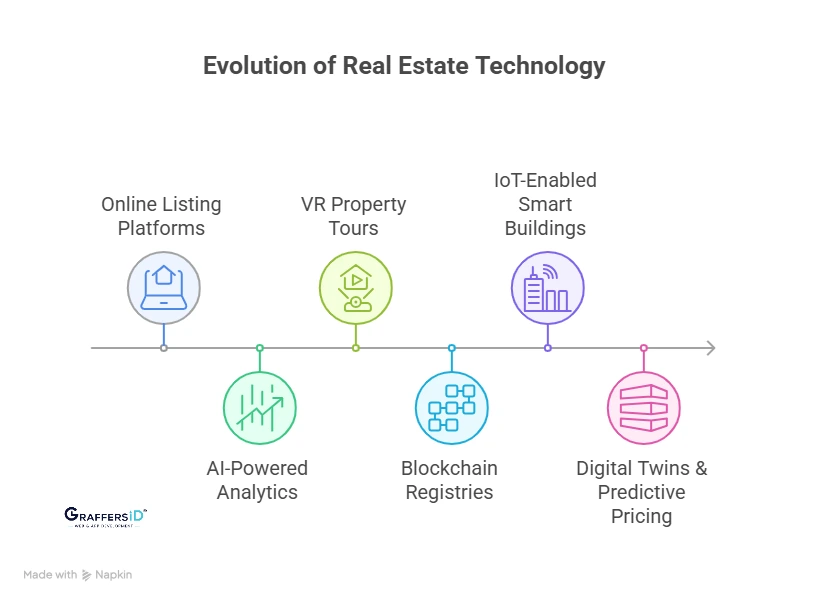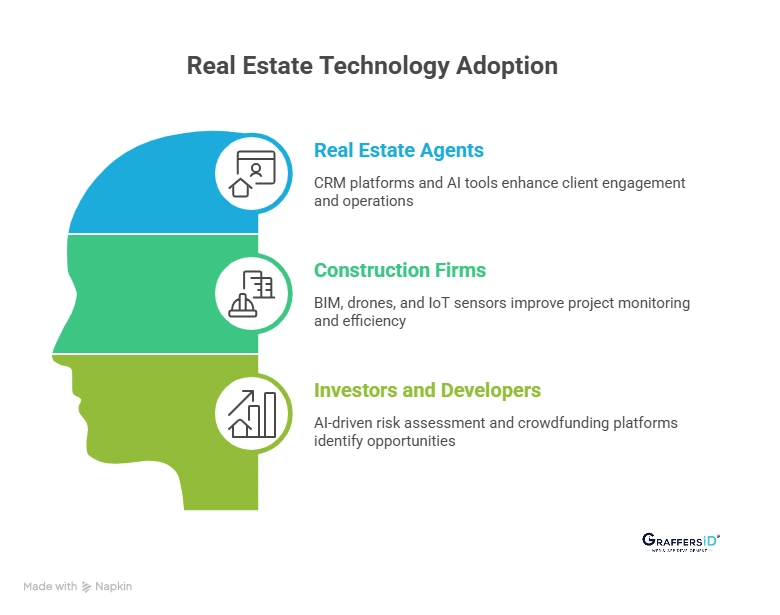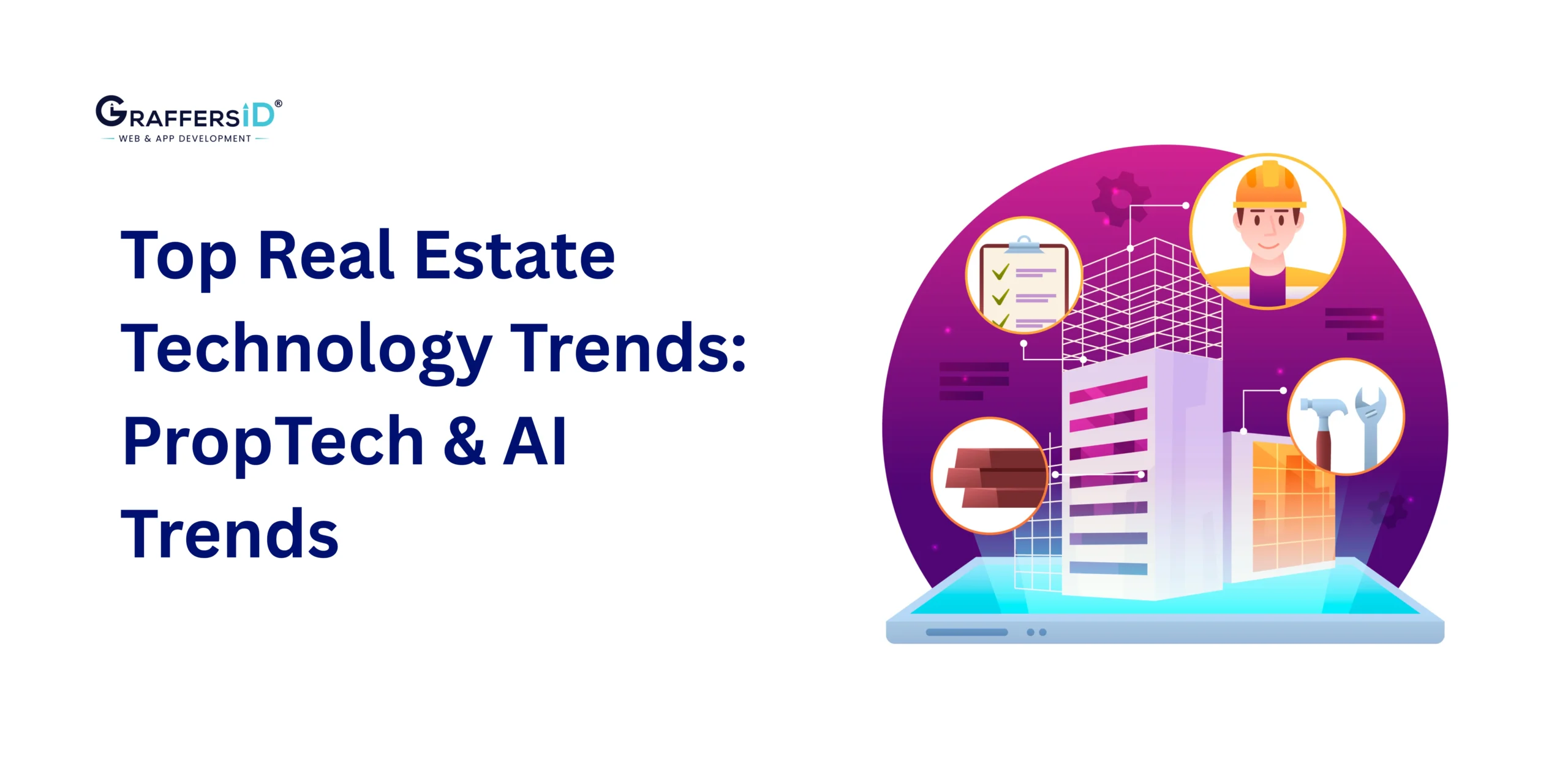The real estate industry in 2026 is being redefined by technology. It’s no longer just about location, design, or price, it’s about how data, automation, AI, and sustainability are transforming every step of the property lifecycle. From AI-driven property valuations to blockchain-secured transactions and immersive virtual tours, technology is reshaping how properties are built, marketed, and managed.
For decision-makers, CTOs, CEOs, investors, and real estate innovators, these emerging technologies aren’t just trends; they’re strategic game changers. In this blog, we break down the top 15 real estate technology trends for 2026, exploring how each innovation is impacting the market and how your organization can stay ahead of the curve.
Evolution of Real Estate Technology
The real estate industry has transformed from manual paperwork and in-person deals to a tech-driven ecosystem powered by AI, automation, and immersive experiences.

Key developments include:
-
Online Listing Platforms: Early 2000s platforms connected buyers and sellers digitally, simplifying property search and listings.
-
AI-Powered Analytics: Modern AI predicts property values, analyzes trends, and provides actionable market insights.
-
VR Property Tours: Virtual tours let buyers explore homes remotely and visualize unbuilt projects.
-
Blockchain Registries: Secure digital records and smart contracts reduce fraud and streamline transactions.
-
IoT-Enabled Smart Buildings: Connected devices monitor performance, optimize energy, and enhance tenant experience.
-
Digital Twins & Predictive Pricing: Virtual replicas and AI models simulate building performance and forecast prices for informed decisions.
Technology has shifted real estate from transactions to experience, sustainability, and data-driven strategies.
Read More: 7 Best Programming Languages for Real Estate & Property Management
Impact of Real Estate Tech on the Market
Tech is reshaping real estate at every level, speeding up transactions, improving accuracy, and enhancing collaboration.
-
Faster Transactions: Automation, e-signatures, and AI chatbots reduce paperwork and turnaround time.
-
Transparency & Security: Blockchain smart contracts ensure trust and prevent fraud.
-
Data-Driven Decisions: AI and analytics forecast trends, optimize pricing, and uncover investment opportunities.
-
Enhanced Customer Experience: VR/AR tours and personalized recommendations simplify property discovery.
-
Operational Efficiency: Automation frees agents and managers to focus on strategy and client engagement.
Adoption of Real Estate Technology by Industry Professionals
Technology adoption is no longer optional; it’s a competitive necessity. Across the ecosystem, agents, developers, and investors are using digital tools to boost productivity, enhance decision-making, and deliver superior value.

- Real Estate Agents: CRM platforms, AI-powered lead generation tools, and automation software are helping agents personalize client engagement, streamline operations, and scale outreach.
- Construction Firms: Technologies like Building Information Modeling (BIM), drones, and IoT sensors are improving project monitoring, safety, and resource allocation, leading to faster, more efficient builds.
- Investors and Developers: From AI-driven risk assessment to real estate crowdfunding platforms, investors are leveraging tech to identify high-return opportunities and diversify portfolios with lower barriers to entry.
By 2026, the most successful real estate professionals are those who combine digital intelligence with industry expertise, embracing innovation not just as a tool, but as a long-term strategy for growth and sustainability.
Top Real Estate Technology Trends Redefining the Industry in 2026

1. AI-Powered Property Valuation and Predictive Pricing
Artificial Intelligence is transforming how properties are valued. Modern AI models analyze not just sales data but also images, satellite visuals, neighborhood trends, and climate risks to estimate property prices with unmatched accuracy. These multimodal AI systems help sellers price their properties competitively and enable investors to make data-backed decisions in real time.
2. Blockchain and Smart Contracts for Secure Transactions
Blockchain-based property registries and smart contracts are ensuring transparency, fraud prevention, and instant verification. From digital title transfers to tokenized ownership, blockchain reduces intermediaries and transaction costs, helping firms close deals faster and build buyer trust.
3. Immersive Virtual Reality (VR) and Augmented Reality (AR) Experiences
VR and AR technologies allow buyers to explore properties remotely through 3D visualization and digital staging. These immersive tools accelerate decision-making, enhance engagement, and bring life to unbuilt projects.
4. PropTech and Automation-Driven Operations
Automation and RPA (Robotic Process Automation) are reshaping property management, handling rent collection, maintenance, and tenant onboarding with precision. Smart CRMs and predictive analytics enable managers to focus on growth strategies instead of administrative tasks.
5. Smart Homes and IoT-Enabled Living
Smart home technologies let homeowners control lighting, HVAC, and security from anywhere. Developers are integrating IoT devices as standard features, making properties more energy-efficient, connected, and desirable to modern buyers.
6. Sustainable and Green Construction Technologies
Sustainability is no longer optional; it’s an expectation. Real estate developers are increasingly adopting eco-friendly construction materials, renewable energy systems, and net-zero building practices. Modular construction and recyclable materials are reducing waste and carbon footprints. With ESG (Environmental, Social, and Governance) mandates rising globally, integrating green tech into design and construction is both a market advantage and a compliance necessity.
7. Predictive Analytics for Market Forecasting
Real estate leaders are turning to predictive analytics to anticipate market movements, pricing fluctuations, and buyer behavior. AI-driven models analyze demographics, economic indicators, and historical data to forecast demand and uncover emerging opportunities. For investors, this means better portfolio diversification and risk management; for brokers, it means knowing exactly when and where to sell or develop next.
8. Digital Twins for Design, Development, and Maintenance
A “digital twin” is a virtual replica of a physical building that tracks performance data in real time. In 2026, developers and facility managers are using digital twins to monitor energy efficiency, detect maintenance issues, and simulate future upgrades. This innovation bridges design and operations, helping stakeholders make data-driven decisions that improve asset longevity and sustainability.
9. Big Data for Real-Time Investment Insights
Big Data continues to be a key driver for informed decision-making. In 2026, real estate platforms are aggregating market data, social sentiment, climate risks, and urban mobility trends to generate actionable insights. This enables investors to identify undervalued regions, developers to optimize project timing, and policymakers to predict infrastructure needs. Data-driven decision-making is the new standard for competitive advantage.
10. Automation in Property Management
Automation tools are simplifying every aspect of property management, from rent reminders to predictive maintenance alerts. Cloud-based dashboards now track occupancy rates, energy usage, and tenant satisfaction in real time. This shift toward AI-assisted facility management helps companies reduce operational costs while offering tenants a smoother, more personalized experience.
11. Cybersecurity and Data Privacy in Real Estate Tech
As transactions, records, and payments move online, cybersecurity has become a top concern. In 2026, real estate firms are investing in blockchain authentication, multi-factor access, and data encryption protocols to safeguard sensitive property and client information. Maintaining data integrity isn’t just good practice, it’s critical for trust, brand reputation, and compliance in a digital-first marketplace.
12. Digital Mortgage and FinTech Integration
Mortgage processing is going fully digital. Borrowers can now get instant loan pre-approvals, AI-based credit evaluations, and blockchain-verified documentation. These innovations reduce paperwork, cut approval times, and improve transparency between buyers, lenders, and brokers. Digital mortgages are a cornerstone of the next-gen home-buying experience, eliminating traditional friction points.
Read More: AI in Real Estate: How PropTech Is Using AI for Pricing, Sales, and Property Management in 2026?
13. Fractional Ownership and Crowdsourced Investments
Crowdfunding and fractional ownership are democratizing access to real estate investments. In 2026, individuals can invest in high-value commercial or residential properties with minimal capital, earning returns through digital platforms. This decentralization of property investment is opening doors for global investors, making real estate more liquid and inclusive than ever before.
14. Climate-Resilient Design and Smart Urban Planning
With rising environmental challenges, developers are integrating AI-based climate risk modeling to plan safer, more resilient infrastructure. From flood-resistant architecture to smart water management systems, climate-adaptive designs are helping cities stay prepared for future risks while maintaining sustainability goals.
15. Generative AI for Marketing and Content Creation
Real estate marketing is entering the generative AI era. Tools like ChatGPT and Midjourney are enabling agencies to generate high-quality visuals, 3D renders, property descriptions, and video scripts at scale. These tools accelerate go-to-market timelines and allow consistent branding across multiple channels, all while saving time and resources.
How Businesses Can Implement These Real Estate Technologies in 2026?
Implementing new technologies in real estate doesn’t have to be overwhelming. A structured approach helps companies maximize ROI while minimizing risks. Here’s a step-by-step framework:

-
Identify Key Pain Points: Start by assessing current workflows and operations. Focus on areas causing friction, such as manual property valuations, slow transactions, tenant management inefficiencies, or low customer engagement.
-
Prioritize Technologies Based on Impact: Not every tech solution fits all needs. Map the challenges you identified to specific innovations, AI for valuation, blockchain for secure transactions, or AR/VR for immersive property experiences.
-
Start with Pilot Programs: Test technology solutions on a smaller scale before full deployment. Pilots allow you to measure effectiveness, collect feedback, and refine processes without disrupting existing operations.
-
Measure Performance Metrics: Track KPIs such as speed of transactions, accuracy of valuations, tenant satisfaction, and operational efficiency. Data-driven insights help justify further investment and fine-tune adoption strategies.
-
Scale and Integrate: Once pilots demonstrate clear benefits, expand the solution across your organization. Integrate technologies with existing systems like CRMs, property management platforms, and marketing tools for seamless operations.
-
Partner with Expert Developers: Collaborating with experienced PropTech and AI developers ensures smoother implementation, customization, and future-proofing of your systems. This reduces the risk of costly errors and accelerates adoption.
-
Continuously Innovate: Technology evolves rapidly. Monitor emerging trends, update your systems, and adopt new solutions to stay ahead of competitors and maintain operational excellence.
Read More: Real Estate Website Development (Step-by-Step Guide)
Future Trends in Real Estate: 2026 & Beyond
The real estate industry is moving toward intelligent, predictive, and adaptive systems. Leaders investing in forward-looking technologies today will define the competitive landscape of 2030. Key trends include:
-
AI Agents for Decision Automation: Intelligent AI agents will automate repetitive tasks, like lead generation, investment analysis, and tenant support, freeing human teams to focus on strategic decisions.
-
Spatial Computing & Digital Twins: Advanced digital twins and spatial computing will allow real-time simulation of properties, energy usage, and urban planning, helping stakeholders make data-backed design and operational choices.
-
Autonomous Building Systems: Smart buildings will self-regulate lighting, energy, and climate based on occupancy, weather patterns, and resource optimization, improving efficiency and sustainability.
-
Predictive Market Intelligence: AI-powered predictive analytics will forecast pricing, demand, and market shifts with higher accuracy, enabling developers and investors to act proactively rather than reactively.
-
Integrated, Intelligent Ecosystems: Future real estate will combine AI, IoT, blockchain, and immersive technologies into cohesive platforms, creating adaptive, responsive, and highly personalized property experiences for buyers, tenants, and investors.
Conclusion
As we step deeper into 2026, one thing is clear: technology is no longer a support system in real estate; it’s the foundation of competitive advantage. The companies leading the market are those integrating AI-powered analytics, blockchain-secured transactions, immersive AR/VR experiences, and sustainable smart solutions into their core operations.
The question isn’t if you should adopt technology, it’s how fast you can do it. Begin by assessing your current workflows:
-
Are your property valuations still manual?
-
Are transactions secure and transparent?
-
Is your customer experience truly digital-first?
Use these insights to strategically implement the technologies covered in this blog, from PropTech automation to predictive analytics, and you’ll position your organization for long-term resilience and growth.
At GraffersID, we help real estate businesses build, scale, and automate with next-gen digital solutions. Transform your real estate vision into a tech-powered success story.
Hire AI PropTech Developers from GraffersID today!





